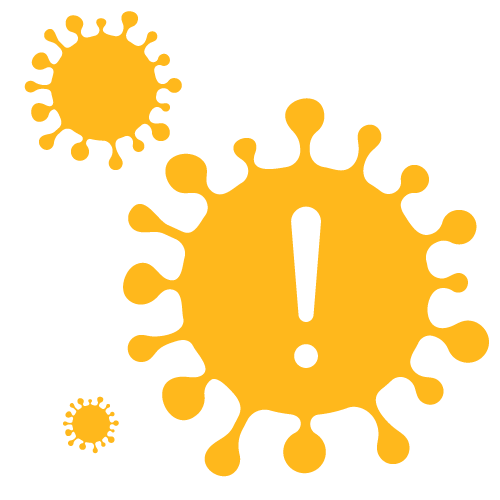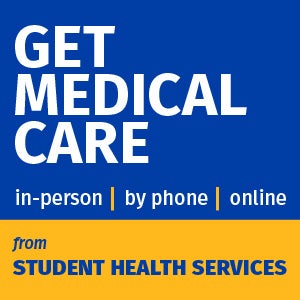
Health and Safety Resources
Helping You To Stay Safe and Successful
We're committed, more than ever, to ensure every student, faculty member, and staffer remains safe, healthy, and productive. While the campus operates remotely, UCR Student Affairs is available to serve students through our virtual offices. We will continue to provide the resources needed to maintain a successful academic journey and the guidance to flourish both in and out of the classroom.
Take the Pledge
All students who come onto campus or other UCR properties must abide by the pandemic mitigation measures imposed in order to help us reduce the spread of COVID-19 at UCR. This includes taking the Keep Highlanders Healthy pledge.
Failure to comply with these regulations may result in a violation of the UC Riverside Code of Student Conduct and may warrant disciplinary measures.
For students moving into campus residence halls, the expectations for living in the halls are outlined in The Resident Handbook. Students living on campus will be required to comply with all city and county public health orders.
Daily Wellness Check
All enrolled students who live, work, or attend classes in-person on campus are required to complete the Daily Wellness Check each day. For additional requirements for students living on campus, visit housing.ucr.edu/fall2020movein.
Student Expectations and Resources
Find out what’s expected of you as a UCR student in a COVID-19 environment and access helpful resources.
- Plans and Protocols: Instructional Continuity Plan – Review the plan, especially Section III. Responsibilities of Instructors, Students and Other In-Person Participants on page 5.
- Residential Life: Newsletters, Handbooks & Policies
- Student Life: Student Organization Resources
- Student Conduct and Academic Integrity Programs (SCAIP): 102.27 Failure to comply with UCR Health and Safety Requirements for COVID-19
Keep Yourself Healthy
Wash
Wash hands frequently with soap and water for at least 20 seconds.
Don’t Touch
Avoid touching your eyes, nose, and mouth.
Clean
Clean and disinfect surfaces that may have been contaminated.
Cover
Cover your coughs/sneezes with a tissue and dispose. If you don't have a tissue, use your elbow, not your hands, to cover your coughs/sneezes.
Avoid
Avoid contact with sick people. Stay home if you are sick.
Stay in Place
Except essential personnel, restrict non-essential movements per California’s stay-at-home order.
Maintain Space
Maintain physical distancing of 6 feet when in public.
Cover Your Face
UC Requirement: Cover mouth and nose when around others or in public.
If You Feel Sick
If you have a fever of 100.4 or greater and/or develop symptoms, stay home, and notify your supervisor if you’re a student worker.
Download and print the Keep Yourself Healthy poster.
UCR COVID-19 Instructional Continuity Plan
Access the UCR COVID-19 Instructional Continuity Plan to find out how UCR is providing a safe and effective teaching environment. Section III. Responsibilities of Instructors, Students and Other In-Person Participants (on page 5) is specific to students.
Access Virtual Resources
Get the help you need with virtual resources on campus, in Riverside County, and at the national level. You can also explore Student Affairs departments for support services, connections to our campus community, and access to basic needs such as food and housing.
Campus and UCR COVID-19 Information and Reporting
- Daily Wellness Check – For faculty, staff, student interns, and student workers coming to campus each day.
- UCR Employee COVID Hotline: (844) UCR-6UCR (827-6827) – For faculty, staff workers, students, health care workers, and contractors working on-site at a UCR property or remotely to report one “new” COVID-19-related symptom, exposure to someone known to have COVID-19, and/or a positive test for COVID-19.
- Environmental Health & Safety’s Coronavirus Webpage – Campus updates, cases, research, return to work protocols, and wellness checks.
- Campus Return – Campus plans/phases, COVID-19 testing lab, and return-to-campus guide.
- AskUCR – Registration and records, managing costs, housing and health, student involvement, and learning support.
- University of California – Systemwide updates and resources.
- Getting Healthy. Keeping Safe. – For students living on campus who have tested positive for COVID-19 or been exposed to the virus, this brochure provides helpful information and resources for your time in quarantine/isolation.
Off-Campus COVID-19 Information and Resources
- County of Riverside Coronavirus Information Line (general information, no medical advice): Dial 2-1-1
- Riverside University Health System – Cases, statewide activities, and toolkits for specific individuals and industries.
- Riverside University Health System Testing Sites – COVID-19 testing locations throughout Riverside County.
- Community Connect – Dial 2-1-1 for COVID-19 updates and referrals for food, shelter, and health-related issues.
- Riverside County Information Regarding COVID-19 Coronavirus – Risk levels, resources, and printable information.
- COVID19.ca.gov – Track cases, access videos, and view the county map to see what’s open.
- COVID19.ca.gov: Blueprint for a Safer Economy – Activity status in your county.
- California Department of Public Health – Getting care, protecting others, and employment information.
- Community-Based Testing Sites for COVID-19 – Testing sites via the U.S. Department of Health & Human Services.
- Centers for Disease Control and Prevention’s Facts about COVID-19 – How to protect yourself and what to do if you’re sick.
- World Health Organization (WHO) – Public and travel advice, country/technical guidance, and media resources.
- Coronavirus.gov – How to protect yourself, check for symptoms, and find testing locations.
You Belong at UCR
All programs, services, and events offered through Student Affairs are open to everyone, consistent with federal and state law and the University of California’s nondiscrimination policies. Whether you’re seeking support, joining a community, or participating in campus life, every effort is made to ensure your experience is inclusive, respectful, and accessible, regardless of background or identity.
To learn more, visit the UC Nondiscrimination Statement or the Nondiscrimination Policy Statement for University of California Publications Regarding Student-Related Matters.

